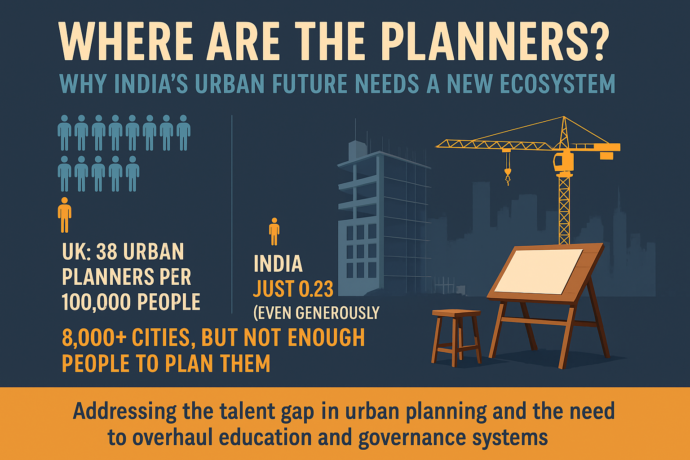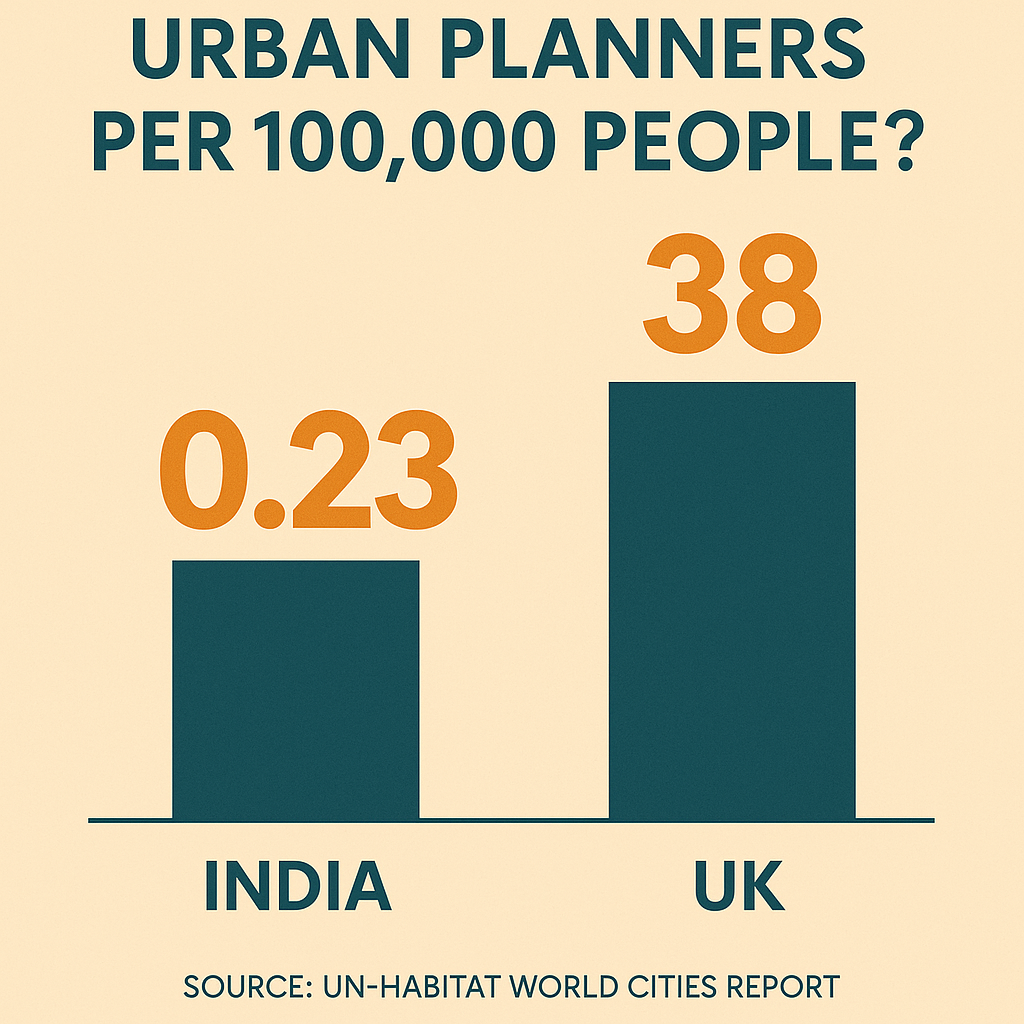where are the urban planners? why india’s urban future needs a new ecosystem

Here’s a number that should make you pause: India has just 0.23 accredited urban planners per 100,000 people. Compare that with the UK’s 38 per 100,000. Even if we generously multiply India’s numbers by 10 to account for unregistered professionals, we’re still at just 14 planners per 100,000 people. For a country with over 522 million urban dwellers and more than 8,000 towns and cities, that’s a planning crisis in plain sight.
Our cities are growing at breakneck speed. But the people who can plan them well? They’re missing.
What Went Wrong with Education?
One of the biggest problems lies at the root — our education system. Urban planning, governance, and design have never been positioned as desirable or high-impact career options. Most students are nudged toward engineering, medicine, management, or finance. These fields promise money, stability, and status.
But here’s the irony: we’re churning out lakhs of engineers every year, and our cities still have poorly designed roads, broken footpaths, and traffic bottlenecks at every corner. Are they being trained in outdated skills? Or is urban development simply not a priority in technical education?
The Missed Opportunity in Urban Education
Imagine if urban development were marketed with the same glamour as software development. What if job fairs highlighted careers in sustainable mobility, inclusive city design, or climate-resilient infrastructure?
It’s not that the opportunities don’t exist. It’s that we haven’t built the ecosystem to support them. India’s top universities rarely integrate urban governance into mainstream curricula. And even when students are interested, the absence of strong mentorship, interdisciplinary exposure, or research funding pushes them elsewhere, often abroad. Which brings us to the next issue.
The Great Brain Drain of Urban Planners
We’ve long accepted the brain drain as a national headache. But have we ever considered how little of that lost talent has entered urban development?

Many bright Indian minds now design metro systems in Europe, consult on resilience frameworks in Southeast Asia, or lead sustainability think tanks in the US. Meanwhile, back home, ULBS (Urban Local Bodies) struggle to fill vacancies with qualified candidates.
Why? Because working in the urban sector is often underpaid, under-recognised, and politically constrained. So the best minds leave. And our cities keep struggling.
Governance Needs an Upgrade Too
It’s not just the education system. Governance structures haven’t kept up either. Recruitment is outdated. Project approvals take months. Procurement is slow. Cross-department coordination is rare. The systems are built for yesterday’s cities, not today’s challenges.
From climate change to congestion, pollution to public health, our cities face 21st-century problems. But we’re trying to solve them with 20th-century tools.
This needs to change.
What Can Be Done? A Dual Reform Approach
To build smarter cities, India must reboot both its education and governance ecosystems. Here’s how we can start:
In Education:
- Introduce civic and urban awareness from the school level — kids should learn how cities function, not just how marks are calculated.
- Mainstream urban development in higher education — as a core career pathway, not just an elective.
- Encourage interdisciplinary learning — blend technology, design, social science, and environmental studies.
- Create public-sector fellowships for urban planning — give young professionals a reason to stay and serve.
In Governance:
- Mandate technical expertise in key urban positions.
- Reform staffing and HR policies to attract the best minds.
- Modernise procurement and project systems — focus on agility, accountability, and innovation.
- Enable collaboration between technologists, planners, bureaucrats, and citizens.
Cities Are Not Code. But They Need Coders.
Smart cities don’t build themselves. We need people who can decode the complexity of real-life urban problems and apply practical, scalable solutions. And we need governance systems that don’t kill ideas with red tape.
Our urban transformation depends on a fundamental mindset shift from “managing chaos” to “designing possibilities.”
The talent exists. The opportunity exists.
What we need now is the ecosystem that brings them together.
This is the 6th article as part of a series exploring the paradoxes of Indian urban planning and seeking possible solutions. Read 1st article here, 2nd here, 3rd , 4th, and 5th here.
